
This story was originally written by Susanna Heller for MSN.com
Thrift-shopping is a great way to buy high-end clothing and accessories well below retail prices. However, when buying used items it’s important to really think about your purchases. Typically, any item that you can clean well is a safe bet. But some items that are difficult to clean and potentially carry harmful germs probably shouldn’t be purchased from a secondhand store.
When you’re shopping at a thrift store, you’ll want to avoid these 12 items:
1. Children’s safety equipment including cribs, strollers, and car seats.
When it comes to children’s safety, you can never be too careful. If you’re considering buying a crib, stroller, or car seat secondhand, you’ll want to thoroughly check these items for damage because, unlike with clothes, the faults on these items aren’t always visible.
Because safety standards change frequently, it’s essential that you do your research to see if the item you want to buy has been recalled, according to Duct Tape and Denim.
Duct Tape and Denim also notes that car seats are only built to last one-car crash. Because it’s close to impossible to know an item’s past while you’re thrift-shopping, buying a used car seat might not be worth the risk.

2. Helmets.
Like car seats, protective bike and motorcycle helmets are only built to withstand one impact, according to Duct Tape and Denim.
Because it can be difficult to know a used item’s history, you’re better off safe than sorry. Not to mention, helmets, like hats, can also be carriers for lice and other infections.

3. Electric appliances.
When considering purchasing used electronics, you should test them out in the store to make sure they work properly, according to Bargain Babe.
Vintage appliances can be faulty and outdated, so it’s best to make sure that they work before you spend money on them.

4. Stuffed animals.
Kids often keep their stuffed toys close, so you’ll want to be very careful when purchasing them used. According to Six Dollar Family, kids’ teddy bears can carry germs, odors, bedbugs, mold, and allergens, among other things.
Though you can clean a stuffed toy by washing it in hot water and using heat to dry it, this could wind up disfiguring it. This method isn’t foolproof, either, and germs could still linger after sanitation.

5. Anything that looks damaged or stained.
While most thrift stores are pretty strict about which donations actually hit shelves, there’s no uniform standard for deciding which items will end up on racks and which won’t. Because of this, it’s important to be critical of items you’re considering purchasing.
Bargain Babe recommends thoroughly checking anything you’re considering buying to make sure it smells OK, doesn’t have stains, fits, and is in otherwise good condition.
You probably wouldn’t wear damaged clothes, so there’s no reason to buy them that way.

6. Underwear.
Some things are better the second time around, but underwear is not one of them, according to Duct Tape and Denim. Unless it’s clear that the panties have never been worn and still have the tags on them, avoid buying underwear from a thrift store.
The same standard applies to bathing suits.

